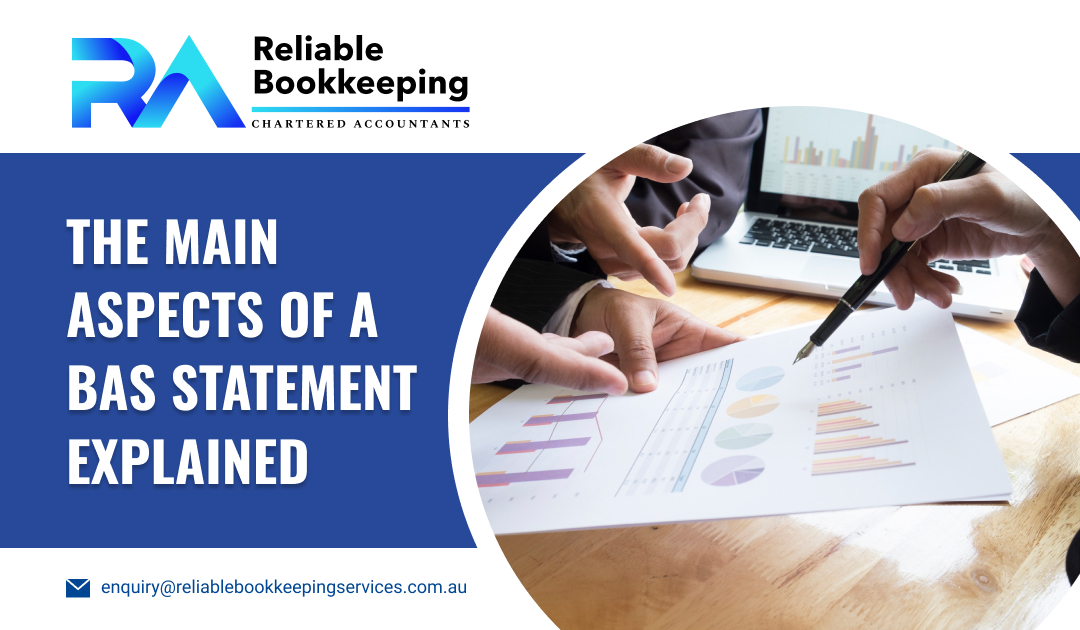If you are unfamiliar with the tax obligations in Australia, you may face some difficulties meeting tax requirements. As a business owner, you must have a basic understanding of things like GST, BAS, and other important elements. If you are not sure where to start, this blog post will help you learn about things that are crucial when preparing a BAS statement.
What is Included in a Business Activity Statement?
The ATO uses the lodged BAS statement to monitor how much tax and GST your company owes. This ensures timely tax lodgment. You can pay online with the help of a professional by the due date. When preparing a BAS statement, you must have accurate records that a professional bookkeeper often prepares. If you don’t have a bookkeeper yet, you can consider seeking help from a bookkeeper for small businesses. A BAS statement includes:
- GST Reporting
GST is one of the most crucial parts of your BAS statement. It is the 10% tax imposed on most goods and services used in Australia. It is a consolidated tax that covers excise duty, sales tax, and other related taxes. As a responsible business owner, you must report how much GST you have collected from the sales and how much goods and services tax you have paid on purchases.
- GST Collected through sales: This is the total GST that you have collected from your customers.
- GST Paid: This is the total amount of GST paid on your business purchases.
- Net GST: A net GST equals the difference between collected GST and paid GST. If the collected GST exceeds the amount you paid, you owe the ATO. On the other hand, if you pay more than necessary, you will receive a refund after filing your BAS statement.
- Pay-As-You-Go Tax Withholding
It is the tax that companies withhold from their employees’ salaries or wages. The withheld amount needs to be submitted to the ATO on behalf of your employees. The primary components of PAYG tax withholding include:
- Gross wages: It includes the total amount of wages you paid
- Tax withheld: The total amount of tax you withheld from their salaries
- Reporting: Report this amount when lodging your BAS to let ATO know that you have paid the exact amount.
- Fringe Benefits Tax Instalments
Many businesses offer additional benefits to their employees, apart from their salaries, to keep them satisfied and motivated at work. It is called fringe benefits. These strategies help companies retain and attract top talent in the long run. It includes reimbursement of personal expenses, a company car for personal use, etc. However, organisations must pay taxes on fringe benefits they provide to their employees. It is calculated on the taxable value of the benefits, and the company needs to file FBT. Ensure you maintain business records to stay updated and organised when filing a BAS form, and pay all taxes on time. Your bookkeeper can keep you aware of the BAS due date, and you can also ask them, ‘How to calculate BAS?’.
- Luxury Car Tax
Luxury Car Tax is a 33% tax imposed on cars with a value over a set threshold. The tax is only imposed on the portion of the car’s value that is over the threshold, not the aggregated value of the car.
- PAYG Instalment
PAYG instalments are regular prepayments of the tax on your investment and business income. If you receive an:
- Activity statement, complete and file it to report your PAYG instalment
- Instalment notice, you are not required to complete or file, unless you wish to change the amount. You can pay the amount mentioned on the notice.
The due date for the next PAYG instalment will be mentioned on your instalment notice or activity statement. When it comes to handling your business’s accounting tasks and other tax affairs for your Melbourne-based business, it’s better to speak to the best accounting firms Melbourne, like our accounting firm.
- Fuel Tax Credits
These are refunds that businesses can claim for the fuel tax included in the value of fuel consumed for business operations.
- Wine Equalisation Tax (WET)
If you are involved in the wine-making, importing and selling business, you will need to fill the WET column in the BAS. The WET rate is 29% of the wine’s wholesale value.
Conclusion
Every business needs to keep track of its accounting and tax records and submit the BAS statement on time. This guide will help you easily understand the key components of your Business Activity Statement and complete the form accurately.
If you have any doubts, you can always refer to the ATO website or get reliable bookkeeping services to ensure your GST and other tax records are properly maintained.

